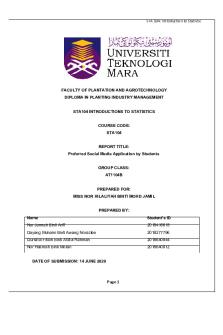Written Report- Ethical Outlook and Cultural Identity PDF

| Title | Written Report- Ethical Outlook and Cultural Identity |
|---|---|
| Author | Francis Dungca |
| Course | Accountancy |
| Institution | Tarlac State University |
| Pages | 4 |
| File Size | 166.1 KB |
| File Type | |
| Total Downloads | 70 |
| Total Views | 203 |
Summary
Francis L. Dungca Jr. BSAIS 2AWritten ReportChallenges of Millennials and Fillinnials(Ethical Outlook and Cultural Identity)In the United Kingdom, a 2013 poll found that Millennials were more open-minded than their parents on controversial topics. In 2013, a Pew Research Poll found that 84% of Gener...
Description
Francis L. Dungca Jr. BSAIS 2A
Written Report
Challenges of Millennials and Fillinnials (Ethical Outlook and Cultural Identity) In the United Kingdom, a 2013 poll found that Millennials were more open-minded than their parents on controversial topics. -
In 2013, a Pew Research Poll found that 84% of Generation Y members favored legalizing the use of marijuana. In 2014, the same research center issued a report revealing that Millennials in adulthood are detached from institutions and networked with friends. Also, one example is same sex marriage the support for same-sex marriage has increased dramatically over the past decade. But as was the case in 2004, there are substantial differences in opinions across generations. Millennials were the most supportive of same-sex marriage a decade ago and have grown more so since then. Currently, 68% favor allowing gays and lesbians to marry legally, up from 44% in 2004. During the same period, the proportion of Gen Xers who support gay marriage increased from 40% to 55% while rising by 18 percentage points among Boomers (30% to 48%) and by 20 points among members of the Silent generation (18% to 38%).
Some authors describe Millennials'’ approach to social change as “pragmatic idealism” -
Idealism is the belief that we should adopt moral principles, even if they have negative effects on our lives. The idealist is willing to suffer to do what she thinks is right. Pragmatism, on the other hand, is a rejection of idealism. If the Idealist's principles get in the way, the Pragmatist does whatever is deemed as practical, with no concerns for morality. Therefore, A deep desire to make the world a better place, combined with an understanding that doing so requires building new institutions while working inside and outside existing institutions.
Millennials are so labeled as the ‘Boomerang Generation’ or ‘Peter Pan Generation’. -
Because of their perceived tendency for delaying some rites of passage into adulthood for longer periods than most generations before them and for living with their parents for longer periods than previous generations. A term applied in Western culture to young adults graduating high school and college in the 21st century. They are so named for the percentage of whom choose to share a home with their parents after previously living on their own thus boomeranging back to their parents' residence. This arrangement can take many forms, ranging from situations that mirror the high dependency of pre-adulthood to highly
independent, separate-household arrangements. The term can be used to indicate only those members of this age-set that do return home, not the whole generation. In as much as home-leaving practices differ by economic class, the term is most meaningfully applied to members of the middle class. Generation Y members are very upbeat and more open to change than older generations. -
Based on a survey by the Pew Research Center in 2008, Millennials are the most likely of any generation to self-identify as liberals and are also more supportive of progressive domestic social agenda than older generations. Millennials nowadays are so mature that they actually want to change the campaign of other politicians for example the students of UP Diliman they are showing their integrity of their rights against Death Penalty, Anti-Terror Bill and other issues occurring here in the Philippines because their mindset is to have a better and a quality education without being stepped on their rights as a student and that is millennials are more braver than to old generation they have the courage to fight for their rights as a human being.
Concerning beliefs on ethical issues, most millennials of every religion, race, and ethnicity support access to affordable contraception according to a study. -
56% of people ages 18 to 35 say that in some situations, choosing to have an abortion "is the most responsible decision that a woman can make. Some other countries with liberated or conservative culture are against with these abortions because for them it is immoral, for example South Korea their government want to pursue the abortion policy but people are against it and people who agrees are being bash by these Korean netizens because of the immorality of choosing having abortion with their country and for them having an abortion is like you are not taking responsibility for the actions that you do that is why think before you act.
A sampling of other findings reveals the following: -
One quarter of millennials say that marriage has become old-fashioned and out date, while 71 percent disagree. Millennials have the mindset of modernizing their thoughts throughout with their experience that is why they are more into the unique and different things whenever it comes to different events such as these weddings and dates and also, on example is the debut of a girl many young girls have not been much into the tradition way itself because they have so many wants in their juncture as a teenager and one of that is travelling or new gadgets for their debut that is why millennials think so much about all the tradition things and that is why they
conclude it as old-fashioned or no originality however, as 71 percent disagree these are people who are passionate to experience their first wedding, date and debut in a traditional way because they think it is special or they might say precious and that is one thing that they want in their lifetime -
Millennials fall into a four way split on “pro-life” and “pro-choice” labels: 25% pro-life, 27% pro-choice, 22% rebuff both labels, 27% both labels describe them The pro-choice and pro-life labels are confusing for a reason: They force people into just two boxes for all their religious, moral, political, and practical beliefs on abortion. Still, a lot of people use these labels (like your fam).Example is Abortion is a really hot topic for millennials nowadays because millennials have the urge to go out in their comfort zone so as a result of these feelings they create a baby as a millennials or teenager they cannot sustenance or have that kind of responsibility of being a mother or father so mutually or one of them one to abort the baby, generally, people who identify as pro-choice believe that everyone has the basic human right to decide when and whether to have children. When you say you’re pro-choice you’re telling people that you believe it’s OK for them to have the ability to choose abortion as an option for an unplanned pregnancy even if you wouldn’t choose abortion for yourself. People who oppose abortion often call themselves pro-life. However, the only life many of them are concerned with is the life of the fertilized egg, embryo, or fetus. They are much less concerned about the life of women who have unintended pregnancies or the welfare of children after they are born. In fact, many people who call themselves “pro-life” support capital punishment (AKA the death penalty) and oppose child welfare legislation. Others reject both labels or they don’t care about both labels because for some others pro-choice is what they want and others pro-life is their choice so to be in the safe zone they do not pick both labels because of the different thoughts of other people into you and others just describe both label because of the indecisiveness whether to pick pro-choice and pro-life they just describe and others have a mix emotion whether or not to abort a child so they acquire the opinion of others before choosing between the two.
-
Seven percent of millennials identify either as lesbian, gay, bisexual or transgender. As you start growing up sometimes you do not know who you are because of the confusion that is surrounding you, sometimes you can find the real you because of your sexuality, likes, hobbies and in the past gender based is not the really complicated if they are a girl they are a girl, if they are a boy they are a boy and that’s it but as the decade pass by people start changing their selves because they want find the real the some boy wants to be a girl and girl wants to be a boy and that is something that is what gender had make impact in to the gender based and
right now there are now many gender not only boy, girl, gay, and lesbian there is bisexual, pansexual, asexual and others because people start relocating their minds and heart of who they really are and it starts with the millennials. People realize that they are gay or lesbian when they have seen or experience that kind of thing that is not related to their real gender and that’s with the confusion and back then people are not confident to tell that they are gay or lesbian because of fear to their parents and to the society but as people have been open-minded and realistic they slowly accepted these called LGBTQIA+ in the society and even to their parents as long as they do not forget to do good deeds and that is why millennials and teenagers have been confidently tell to the world who they really are....
Similar Free PDFs

Cultural Identity Essay
- 3 Pages

Cultural identity wheel
- 3 Pages

Cultural Analysis Written Exam
- 3 Pages

Oil and gas outlook guide 2019
- 36 Pages

Anxiety Disorders (Written Report)
- 19 Pages

Written report operating segment
- 22 Pages

Assignment STA Written Report
- 19 Pages

Written Report Plywood
- 6 Pages

Group Written Report FIN242
- 20 Pages
Popular Institutions
- Tinajero National High School - Annex
- Politeknik Caltex Riau
- Yokohama City University
- SGT University
- University of Al-Qadisiyah
- Divine Word College of Vigan
- Techniek College Rotterdam
- Universidade de Santiago
- Universiti Teknologi MARA Cawangan Johor Kampus Pasir Gudang
- Poltekkes Kemenkes Yogyakarta
- Baguio City National High School
- Colegio san marcos
- preparatoria uno
- Centro de Bachillerato Tecnológico Industrial y de Servicios No. 107
- Dalian Maritime University
- Quang Trung Secondary School
- Colegio Tecnológico en Informática
- Corporación Regional de Educación Superior
- Grupo CEDVA
- Dar Al Uloom University
- Centro de Estudios Preuniversitarios de la Universidad Nacional de Ingeniería
- 上智大学
- Aakash International School, Nuna Majara
- San Felipe Neri Catholic School
- Kang Chiao International School - New Taipei City
- Misamis Occidental National High School
- Institución Educativa Escuela Normal Juan Ladrilleros
- Kolehiyo ng Pantukan
- Batanes State College
- Instituto Continental
- Sekolah Menengah Kejuruan Kesehatan Kaltara (Tarakan)
- Colegio de La Inmaculada Concepcion - Cebu






